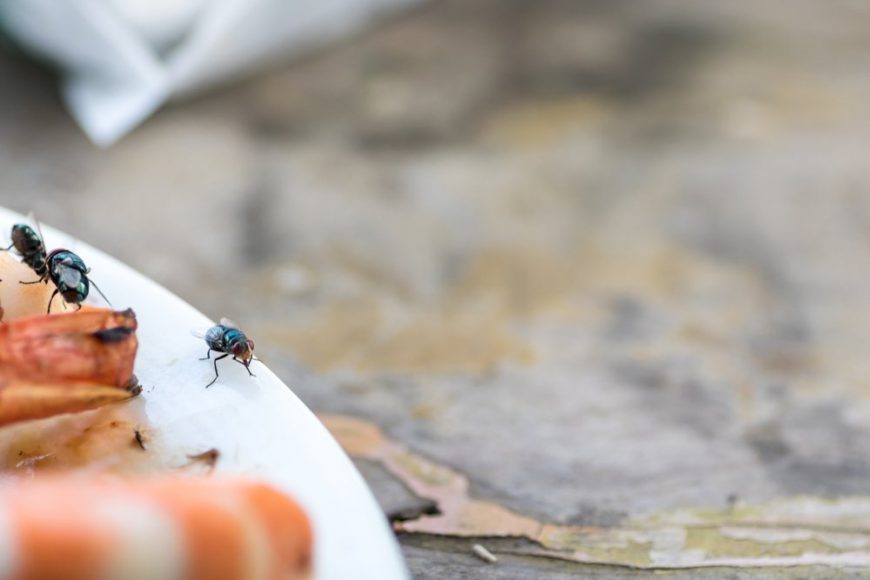Most people would agree that a beautiful day can be quickly interrupted by the buzzing sound of a fly. As we approach fall in Houston, these winged insects show no sign of slowing down. In fact, you may feel like there’s no way to avoid them. You can find them almost anywhere – out on a walk, out on the town, or even inside your home.
Flies are not only a nuisance, but they can pose potential harm to your health. Every time they land, they deposit thousands of bacteria that can quickly spread. To prevent yourself from getting sick due to a fly, here’s what you should know about Houston flies, including characteristics, how they can make you sick, and how to get rid of them.
Also read: How to Keep Flies Out of the Office
What Flies Are Common in Houston?
There are several different species that you can find in Houston, but only three present a real problem to people.
Fruit Flies
Fruit flies are oval-shaped flies with translucent wings. Their thorax is tan, and their abdomen is black with a gray underbelly. However, from a distance, only their tan coloring and red eyes are visible (though some have darker eyes). These insects are also tiny. Adults grow to 1/8th of an inch in length.
Fruit flies are known for their love of feeding on ripe fruits and vegetables and typically enter your home in search of produce. They can easily pass through screens or cracks in your home and move from room to room. More often than not, you’ll find them around garbage, sewers, or drains. Once inside, they’ll lay their eggs in your produce and other fermenting materials.
House Flies
The house fly is a widespread, medium-size insect. Like fruit flies, they’re small and usually grow up to 1/8th of an inch. Unlike fruit flies, the female housefly is larger than the male. They’re dark color in color, with four black stripes on their thorax, and two silver lines on their face. House flies are covered in small fines that give them a “velvety” appearance. These hairs function as their taste organs.
House flies do not bite and cannot eat solid food. Yet, they are attracted to food its sense of smell. They vomit on solid food to break it down in order for them to suck it up in a liquid state. Unlike fruit flies, house flies typically lay their eggs away from your home, preferring manure and other decaying material.
Fungus Gnats
Fungus gnats look more like mosquitoes than they do traditional flies. This is because they have small bodies and long wings and legs. They’re black or grayish and have a Y-shaped pattern across their darker grey wings. Like fruit and house flies, they only grow to be 1/8th of an inch long.
If you have house plants or a greenhouse, you’re more likely to common in contact with a fungus gnat. They’re attracted to the moisture of potting soil and use it to lay their eggs.
How Do Flies Make You Sick?
All flies eat by vomiting up stomach acid on their meal and then sucking it up in a liquid state. Every time they do this, they leave bacteria behind that can potentially spread to a person nearby. House flies, in particular, are bigger harbingers of disease because of the tiny hairs on their body. These hairs are ideal carriers for bacteria, so as they fly from one place to another, the bacteria go with them.
Similarly, all species of flies have a large number of microorganisms in their intestines that is expelled every time they feed. Coming into contact with an area that’s been touched by numerous flies can directly make you sick if you don’t clean yourself after.
How Do I Prevent Flies?
The first step in controlling your problem is recognizing which type of fly you have. For example, if you realize you have an overabundance of fruit flies, then you’ll want to dispose of any produce properly you’re not using. If you have a fungus gnat problem, you’ll want to be careful with overwatering your potting soil. And for house flies, you’ll want to be sure to maintain a clean home overall. Other measures you can take to prevent an infestation:
- Tightly seal all doors, windows, and other entrances to your home.
- Keep trash cans tightly sealed and remove excess food waste.
- Keep your kitchen clean (including dishes, refrigerator, and countertops).
- Regularly take out your garbage.
- Seal containers of honey, vinegar, molasses, or other sweeteners.
- Maintain a clean garden.
- Use insecticides when needed.
Also read: How to Eliminate Fruit Flies
Even with these measures, you may still have to deal with flies. Flies have lived near humans for a long time, making them resistant to many over-the-counter insecticides and other methods of control. Still, by understanding what type of fly issue you have and how to deal with them, you should be able to have success with treating the problem. For a persistent problem, it’s best to contact professionals like Cypress Creek.



